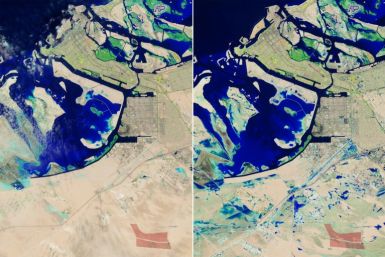Mount Everest: Heavy snow prevents 2015 Peak Expedition; beginners, disabled and elderly may soon be banned
The dreams of climbers aiming to reach the peak of Mount Everest are now shattered, as heavy snow around Nepal's Himalaya Mountains over the last few weeks of September have made it difficult to continue with the Mount Everest 2015 Peak Expedition.
At the same time, Nepal is reportedly planning to ban inexperienced climbers from climbing the highest peak in the world, including denying Everest permits to the elderly and disabled.
AccuWeather reports that more than two feet of snow fell at the base camp of Mount Everest in mid-September, which has made climbing routes trickier. The heavy snowfall forced many to abandon their plans of climbing and reaching Mount Everest’s peak.
One Japanese climber, Nobukazu Kuriki, took to Facebook to share his experience. He said that moving in the snow was tough although he had tried to continue his climb despite the unfavourable weather.
"I left the final camp a little after 8pm on 26th for summit push. I tried hard taking all my energy, but it took too much time to move in deep, deep snow," Kuriki posted in Japanese on his Facebook page.
Climbers of Mount Everest have very few opportunities to reach its peak. One is in the spring, during May and the other is in the fall, during September. It's ideal to climb the mountain before or after winter and before or after the monsoon season. Unfortunately, in 2015, those opportunities weren't taken advantage of because of the earthquake in April and the late departure of the monsoon in September. The next best time to climb Mount Everest is in the spring of 2016. But it will still depend on the weather during that season.
Unfortunately, Nepalese officials are planning to make new laws as a measure to tackle safety and overcrowding concerns in Everest, according to the Associated Press. Notably, these reforms are being planned by Nepal after the death of several people in an avalanche on April 25.
The Guardian reports that climbing permits to Everest will only be give to those who can prove that they have experience scaling mountains higher than 6,500 metres. Nepal’s tourism minister, Kripasur Sherpa, is planning to bring this proposal into implementation before spring as the mountains are the busiest during this period. In addition to the new set of rules and regulations, the government also plans to stop access to the highest peaks of the Himalayas to climbers who are disabled, under 18 years old or over 75 years old.
This step is being taken to secure the lives of the climbers as well as the guides in the area after the numerous deaths in the April avalanche. Nepalese officials are hoping that these planned restrictions will prevent more deaths and accidents in the Himalayas.
Unfortunately, the said ban on specific groups of Mount Everest climbers could affect the revenue and economy of Nepal. Climbing permits are said to be one the biggest sources of income in this impoverished country and this ban may lead to huge losses. This may also cause political troubles for Nepal as well as accusations of discrimination.
Contact the writer at feedback@ibtimes.com.au, or let us know what you think below.






